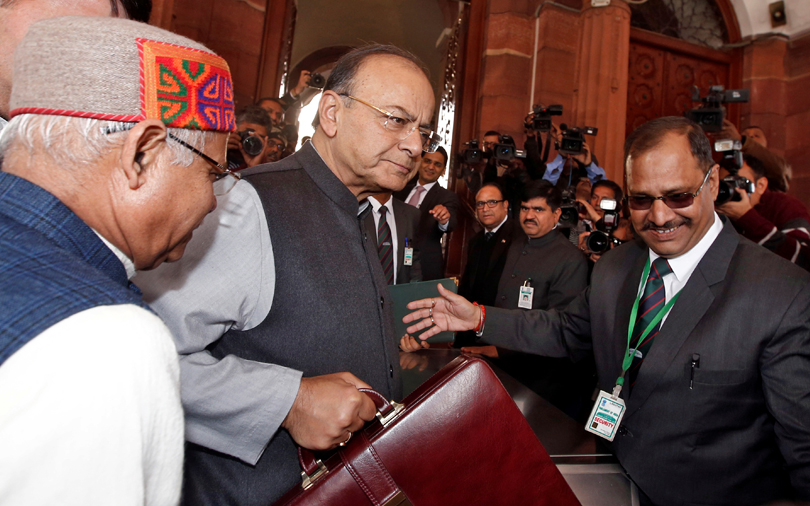
Finance minister Arun Jaitley promised more measures to boost the alternative investment fund (AIF) industry on Thursday but didn’t outline any big-bang steps in the Union Budget 2018-19, leaving the stakeholders a tad disappointed.
“Venture capital funds and angel investors need an innovative and special developmental and regulatory regime for their growth,” Jaitley said in his budget speech. “We will take additional measures to strengthen the environment for their growth and successful operation of alternative investment funds in India.”
Gopal Srinivasan, chairman at Indian Private Equity and Venture Capital Association (IVCA), said Jaitley’s comments show the industry has come of age with Rs 1.5 lakh crore of PE/VC investment in 2017. “The recognition is a major takeaway for us,” he said.
Saurabh Srivastava, co-founder and director at the Indian Angel Network (IAN), welcomed the recognition of the contribution made by angel investors and VCs, and the promise of creating more enabling regulations in this area.
AIFs, which are privately pooled investment vehicles that collect funds from both Indian and foreign investors, form a fledgling industry in India. But the government has announced at least 27 policy measures in the past three years to help the industry. These steps include the rolling out of the “Start-Up India” programme and a taxation regime designed for the special nature of VC funds and angel investors.
Hits
Srinivasan said the industry would have been delighted had the long-term capital gains (LTCG) tax rates on listed shares had been 15% or 20% instead of the proposed 10% to bring the taxation regime in parity with PE and VC funds.
“The 10% rate is a first step. We hope that eventually, risk taking, long-term capital invested in unlisted companies will ultimately be taxed at the same rates as public market equity. VC/PE underwrite large amounts of risk while making long-term investments in private companies and also focus on building the companies, hence steps towards parity in taxation is welcome,” said Srinivasan.
The government has proposed to tax long-term capital gains from listed shares exceeding Rs 100,000 at the rate of 10% without allowing the benefit of any indexation. Jaitley has also proposed to introduce a tax on distributed income by equity-oriented mutual funds at the rate of 10% to provide a level-playing field across growth-oriented funds and dividend distributing funds.
“The convergence in taxation of gains from investments in listed and unlisted companies now introduced significantly reduces the historical tax arbitrage between these asset classes. The industry would hope this should raise domestic capital allocations to the PE/VC asset classes,” said Subramaniam Krishnan, tax partner, financial services, EY India.
The reduction in tax for companies with less than Rs 250 crore turnover is also good news because these are primarily companies that benefit from private equity and venture capital firms, said IVCA’s Srinivasan.
Industry experts were also upbeat about the budget’s focus on lifting the rural economy, which employs over 70% of the Indian population.
“This should put a tailwind behind the domestic consumption story and augurs well for PE/VC funds with exposure/investments in sectors that cater to consumption needs of rural India,” said Vivek Soni, partner and leader for PE advisory at EY India.
Misses
On the flip side, the LTCG tax will come as bad news for a string of PIPE funds, or those that make private investments in public equities. Several PIPE funds have been launched in the past few years in the wake of the buoyant stock market.
While the government held out hope for the AIF industry, it did not address some of the long-standing demands of the industry.
The budget left the angel tax, which has long been a contentious issue in the startup community, untouched. Several startups have been hit with tax notices over funds raised from friends, family, angel investors or angel networks not registered with the markets regulator or as AIFs and if the infusion is higher than the company’s fair market value.
The AIF was keenly watching for tax clarity on Category III AIFs, but Jaitley didn’t make any relevant announcement, said Divaspati Singh, associate partner at law firm Khaitan & Co.
Category III funds includes hedge funds and PIPE funds. Currently, there is no framework for the Category III funds, so every assessing officer is taxing such funds at different rates.
Khaitan’s Singh also said that the Finance Bill 2018-19 seeks to introduce stringent penalties on investment funds—AIFs, Real Estate Investment Trusts (REIT), Infrastructure Investment Trusts (InvITs)—for non-compliance of the regulations and guidelines issued by the Securities and Exchange Board of India (SEBI).
Broadly, the government has proposed to amend the SEBI Act to impose a monetary penalty on investment funds if they contravene any SEBI regulation or circular. The penalty is a minimum of Rs 100,000 which could go up to Rs 10 million.
“The penalty is for all AIFs, as they are also governed by SEBI. Since AIFs are also investing in securities market they do not necessarily need to be listed and governed by them,” said Singh. The industry has to be henceforth cautious in its dealings because SEBI has become active in its surveillance, he added.